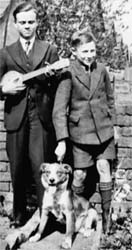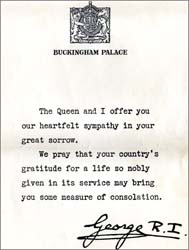In memory of Oliver Holland
In memory of Oliver Henry Selby Holland
 Oliver Holland grew up in his native Caerphilly with his brother Ken and sister Peggy. The family lived at 9 West Avenue and later 15 Lawrence Street. Oliver played the guitar and was a chorister at St Catherine’s Church, Caerphilly. Peggy was a singer and tap dancer, appearing in local shows and pantomimes, while Ken played the violin. The photo on the right shows Oliver, playing a ukelele, with Ken.
Oliver Holland grew up in his native Caerphilly with his brother Ken and sister Peggy. The family lived at 9 West Avenue and later 15 Lawrence Street. Oliver played the guitar and was a chorister at St Catherine’s Church, Caerphilly. Peggy was a singer and tap dancer, appearing in local shows and pantomimes, while Ken played the violin. The photo on the right shows Oliver, playing a ukelele, with Ken.
From 1933 to 1936 Oliver was a day scholar at Caerphilly’s Mining and Technical Institute (known locally as Caerphilly Tech) and completed a course in General Engineering. This practical education stood him in good stead and aged 16 he joined the RAF as an aircraft apprentice. In March 1936 he started his apprenticeship at RAF Halton near Wendover, Buckinghamshire. He remained there for three years and qualified as a flight mechanic. He then signed up for a 12-year engagement with the RAF from his 18th birthday.
Oliver’s first posting as a flight mechanic was to RAF Watton in Norfolk on 1 August 1939 – just over a month before the Second World War broke out. He remained at this aerodrome for nearly a year, working on Bristol Blenheim light bombers.
 Oliver continued to play the guitar while at RAF Watton and in letters home would tell his family of the concerts and revues that he had performed in to entertain the troops. He regularly performed in a duet with Flying Officer Gibbs and performed on the same stage as luminaries such as Billy Milton and the comedian and violinist Stanelli.
Oliver continued to play the guitar while at RAF Watton and in letters home would tell his family of the concerts and revues that he had performed in to entertain the troops. He regularly performed in a duet with Flying Officer Gibbs and performed on the same stage as luminaries such as Billy Milton and the comedian and violinist Stanelli.
In April 1940 Oliver was promoted to Leading Aircraftsman (LAC) and was responsible for the flight commander’s plane. At this time his squadron moved from RAF Watton to RAF Bodney, a much smaller Norfolk airfield.
In June 1940 Oliver’s squadron moved again, to RAF Lossiemouth in north-east Scotland. Germany had recently invaded Norway, and Lossiemouth was the RAF’s base to attack German Naval targets in the Norwegian fjords. This in turn made this part of Scotland a target for German bombers, and Oliver wrote to his parents about the dog fights he’d witnessed between British fighters and German planes over the Moray Firth.
 In September 1940 Oliver was promoted to Corporal and was responsible for overseeing and signing off the maintenance work of two Blenheim aircraft. On 26 October 1940 he posted his last letter home, in which he looked forward to taking Peggy and Ken to Cardiff on his next leave. At dusk that evening, the only major Luftwaffe raid on RAF Lossiemouth occurred. Three Heinkel He111 bombers made a surprise attack, bombing a line of Blenheims that were being prepared for a night raid. Corporal Oliver Holland was in one of the cockpits and was killed instantaneously. He was 20 years old.
In September 1940 Oliver was promoted to Corporal and was responsible for overseeing and signing off the maintenance work of two Blenheim aircraft. On 26 October 1940 he posted his last letter home, in which he looked forward to taking Peggy and Ken to Cardiff on his next leave. At dusk that evening, the only major Luftwaffe raid on RAF Lossiemouth occurred. Three Heinkel He111 bombers made a surprise attack, bombing a line of Blenheims that were being prepared for a night raid. Corporal Oliver Holland was in one of the cockpits and was killed instantaneously. He was 20 years old.
Squadron leader GS King described him as “a grand fellow who I had promoted a short time ago as he was so excellent at his job”. King George VI's letter to the Holland family is shown on the right.
Oliver was buried with full military honours in Caerphilly’s Penyrheol Cemetery.


